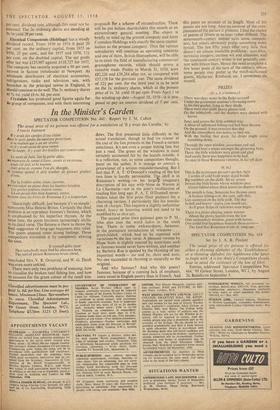In the Minister's Garden
SPECTATOR COMPETITION No. 441: Report by J. M. Cohen
The usual prize of six guineas was offered for a translation of '11 y avait des Carafes,' by Francis famines: li y avail des carafes d'eau claire
dans le petit jardin du minisire protestant, sa nfaison qui a un air severe; et it y avail aussi de gros verres stir Ia nappe. II y avail des feuilles aux contrevents.
Le 1710i8 de Juin. Sur la petite allee, kit aorceare de carne a Ugric, cassde et en roseate, 'wait (qe jets, et la internee emit grise et, comae ion din, charge, er comae quarrel it doit tomber de grosses gouttes d'eare.
Peer la fentitre noire, triste, °reverie, on entendait un piano dans les lauriers lamas. Les petites fenetres etaient vertes.
La on devait etre bier heureux, eertes,
conune dans les litres de Rousseau it y a longtemps.
'Shockingly difficult, just because it's so simple,' comments Miss Helena Broun. Certainly the chief problem is to reproduce Jammes's flatness, which is emphasised by his imperfect rhymes. At the same time, the poem becomes increasingly idyllic in its third verse. The flatness is there to throw the final suggestion of long-ago happiness into relief. The poem aroused some strong feelings. Three competitors travestied it by completely altering the tone.
It seemed quite clear That somebody must find his pleasure here, The sort of person Rousseau wrote about, concluded Mrs. V. R. Ormercid, and W. G. Daish was even more unkind.
There were only two problems of meaning; how to visualise the broken reed fishing line, and how to account for the green colour of the small win- dows. The first presented little difficulty in the actual translation, though to find 'en roseau' at the end of the line presents in the French a certain anticlimax. It's not even a proper fishing line, but just a reed. The green of the windows is most certainly accounted for by the laurels outside; it is a reflection, not, as some competitors thought, paint on the sashes. It is strange to convict a prizewinner of a serious misunderstanding. But I feel that P. A. T. O'Donnell's reading of the last two lines is hardly permissible. Tke idyll is in Rousseau's writing—in his large M imaginary description of his stay with Mme de Warens at La Charmette—not in the poet's recollection of reading him long ago. P. A. T. O'Donnell never- theless takes the first prize (four guineas) for a charming version. I particularly like his transla- tion of chargee. This requires a slightly unfamiliar word; heavy or lowering would not need to be modified by as they say.
The second prize (two guineas) goes to P. M., who also uses the word laden in the ninth line. There is some awkwardness, however, in the premature introduction of 'windows . . green-lidded,' which had to be repeated with variations in the last verse. A pleasant version by Hope Scott is slightly marred by inversions such as Jammes would never have written, and another by Barbara Roe is spoiled by the rhyming of un- important words— see and be, there and were, No one succeeded in rhyming as naturally as the original.
And why Jammes? And why this poem? Jammes, because of a cunning lack of emphasis, more usual in English poetry than in French. And
this poem on account of its length. Most of his poems are too long. Also on account of the com- pleteness of the picture it presents. I find the choice of poems of fifteen or so lines rather difficult. The seventeenth-century sonnet suits some competi- tors, but others obviously prefer something more lyrical.. The last fifty years offer very little that doesn't set almost insoluble problems: vers libre, surrealist imagery, curious wit and allusions; and the nineteenth-century writer is not generally con- tent with fifteen lines. Hence the need to explore a few lesser poets of the turn of the century, whom some people may prefer to the much-acclaimed giants, Mallarmd, Rimbaud, etc. 1 sometimes do myself.
PRIZES
(P. A. T. O'DONNELL)
There was clear water in the flasks arrayed Under the protestant minister's frowning eaves In his tiny garden, lying in their shade. There were also solid, heavy glasses laid On the tablecloth; and the shutters were choked with leaves.
June; and across the little cobbled way A sliver of splintered fishing-rod had been thrown On the ground; it was overcast that day
And the atmosphere was laden, as they say,
With the feeling that great, fat drops might come trembling down.
Through the open window, cavernous and sad.
One could hear a piano amongst the glistening bays.
There, the little windows were green and glad And surely there was happiness to be had, As once in those Rousseau volumes, in far-off days.
(P. M.) This is the protestant parson's garden. here Carafes of cold fresh water stand beside Big tumblers on the cloth. An air severe Invests the little house whose windows peer Green-lidded where thick leaves itsshutters hide.
The month is June. Someone has thrown away
A broken fishing-rod; the cane, split thin, Lies scattered on the little path. The day Is dull and heavy—laden you would say,
As if great drops of rain must soon begin.
There is a piano playing, music weaves
About the glossy laurels from the low Dim melancholy window, green with leaves. One could find happiness beneath these eaves—
The kind that Rousseau wrote of, long ago.






























 Previous page
Previous page